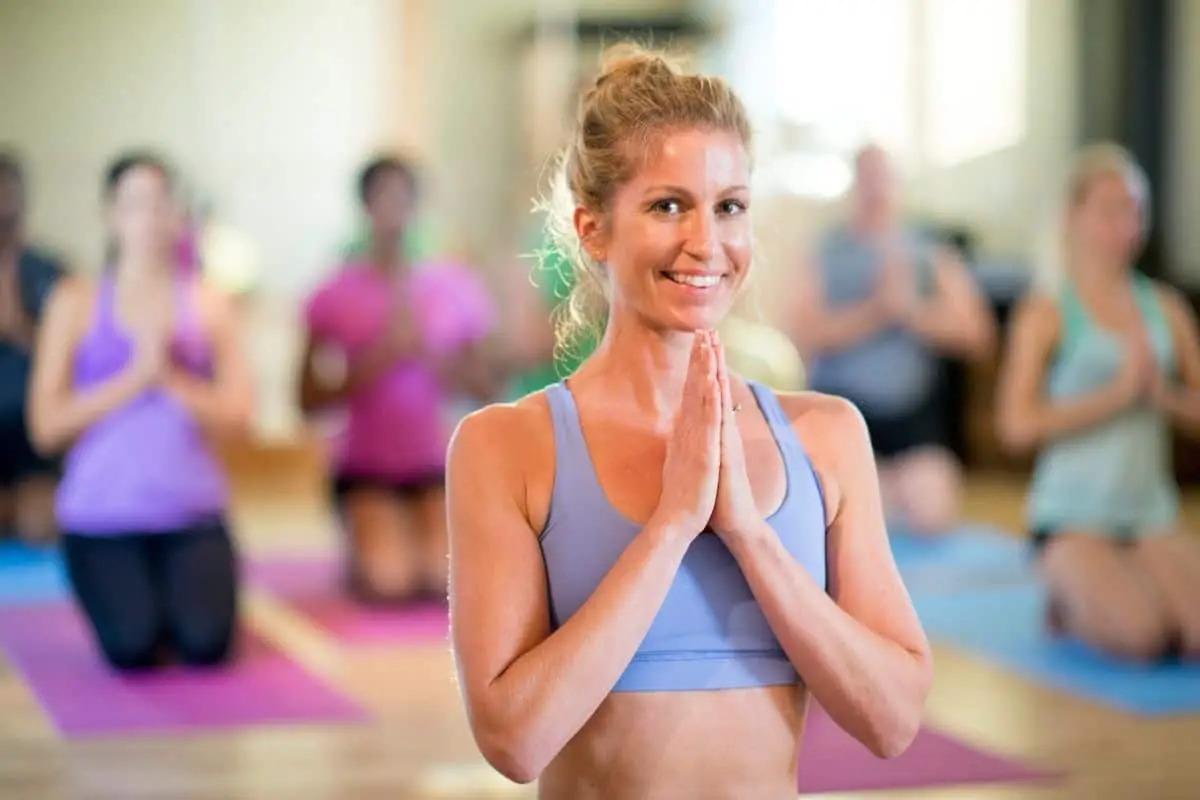Whether you are looking for a new yoga teacher or aspire to become one, knowing what makes a good yoga teacher is vital. Great yoga teachers have some qualities that make their classes more pleasant and relaxing than others. Having a bad experience with a yoga class can turn you against yoga, so you should always look for teachers with good qualities.
Every great yoga teacher should have authenticity, compassion, trustworthiness, patience, humility, and preparedness. Having a lousy yoga teacher can make yoga class an unpleasant experience. Still, great yoga teachers will bring more light into your life.
Teaching yoga is not just a job. It requires some special skills to be a great yoga teacher, and having these qualities will ensure that every student gets the most out of a yoga class. Read on to find out what these qualities are.
Authenticity
Yoga teachers should love what they do, and their passion for yoga should be apparent in how they teach. Those who appreciate yoga’s history and practice can instill excitement in their students, making authenticity an essential quality of a great yoga teacher.
Yoga teachers will inspire their students if they have a real passion for teaching yoga. Good teachers keep an everyday practice of yoga in their personal lives, and they research the history and tradition of yoga practices. Since each yoga position has multiple names, purposes, and benefits, yoga teachers should share their knowledge with their students so that they can get to know their own bodies better.
They will also share their knowledge and love of yoga with their students. When your yoga teacher knows their stuff, it is a lot easier to trust them and learn from them. Knowing more about yoga positions and routines can help you understand your body and mind better. Good yoga teachers know that, and they will help their students get more in touch with themselves.
Their love and passion for it will make yoga classes educational and fun for all of their students. Teachers who are enthusiastic about their practice are more likely to succeed because their students will trust and respect them.
Compassion
Compassion is one of the most essential qualities that a yoga teacher can have. Great yoga teachers are inspiring, and they share their light with all of their students. They find a way to connect with all of the students in their class and are genuinely concerned with everyone’s safety and health.
Yoga teachers should never make fun of their students or make them do anything that they do not want to do. Yoga teachers who are rude, unkind, or inappropriate will make their classes unbearable for their students since no one will be able to relax.
They will also remind their students not to push their bodies too hard and often tell their students to listen to what their body wants when practicing yoga. Compassionate teachers will help their students accept the limits of their bodies without judging themselves. This can be very encouraging for students, so teachers should always encourage them to be true to their own bodies’ needs.
Compassionate yoga teachers will notice if anyone is struggling and help people who want that help. They will ask before they touch you, and will ask you what you want from your yoga practice. Good yoga teachers will always be kind and considerate of their students. They will honor and respect their students’ boundaries and limits.
Adaptability
Have you ever been to a yoga class that is far too advanced for you? Good yoga teachers will recognize when people in their class struggle, and they will adapt their teaching plan to fit the needs of the least advanced person in the room. This keeps the class engaged, and it can keep students from feeling frustrated with the teacher or themselves. Overall, adaptable yoga teachers make sure that everyone is included and supported.
They should always give their students options on how to do every position. Especially in mixed-level classes, some students are more advanced, and others are complete beginners. Great yoga teachers will start off in more simple positions and give advanced students the option to move into more advanced variations of the same position.
When yoga teachers provide their students with options, they allow more advanced students to challenge themselves just as much as the beginner students do. Yoga teachers that adapt their teaching plan to their students ensure that no one in the class is left behind or frustrated.
Kindness
Yoga teachers that try to connect with their students can be very uplifting and encouraging. Great yoga teachers usually introduce themselves to everyone in the class, and their lessons are a lot more interactive. They will communicate directly with the students in their class and will usually make remarks on how everyone is doing.
Some yoga teachers lead the class through their practice without even looking at their students, but good yoga teachers never do this. Yoga classes are all about connecting with positive people, so if you want to feel uplifted and appreciated, you should look for a kind yoga teacher.
Yoga teachers should always attempt to help anyone in the class who is struggling with a particular position. They should respect the wishes of anyone who is uncomfortable with moving into a new position. A great yoga teacher will adjust their teaching if one of their students is uncomfortable and they will usually offer them a modified position if they do not want to go into the full position.
Patience
Yoga teachers should be patient. Yoga is supposed to be a peaceful practice. Suppose a yoga teacher moves too quickly or gets impatient with their students. In that case, everyone in the room will also start to feel that impatience and frustration.
Yoga teachers should always take their time when guiding students through meditation and yoga practices. When they instruct a group of people through a yoga routine, moving from position to position too quickly can break the class’s relaxing, meditative atmosphere. Speaking too fast or moving from position to position without much pause will interrupt a yoga class’s meditative flow, so teachers should always be patient.
They will also teach their students how to be more patient with themselves. Yoga can be challenging for some people, so yoga teachers need to teach their students to accept their limitations and slowly work towards more advanced positions. A great yoga teacher will recognize when anyone has become impatient. They will encourage students who have become frustrated to relax and just do their best.
Trustworthiness
Yoga teachers should be trustworthy. When you go to a yoga class, you trust the instructor with your body and mind, and that trust should never be broken by misconduct or bullying. Yoga teachers that violate the trust of their students risk their reputation and their whole practice.
If you are worried about being criticized or touched inappropriately, you will not enjoy your yoga class. No one can relax when they are concerned about being bullied or assaulted. Maintaining a professional and compassionate attitude is vital for any yoga teacher who wants their students to trust and stick with them.
There is also a certain amount of confidentiality that yoga teachers should maintain. Yoga teachers should never talk about their students outside of class. Suppose a yoga teacher’s students are worried that their yoga teacher will talk about them behind their back or make fun of them. In that case, their students will quickly distrust their teacher and possibly look for a new one.
When you trust your yoga teacher, you will be more likely to try new things, share your opinions, and accept help when you need it. Good yoga teachers will create a non-judgmental environment where all pupils feel comfortable expressing themselves and trying new things.
Preparedness
Yoga teachers should always be prepared for their classes. Good yoga teachers always show up early, prepare all of the materials that their students will need, and set up the environment that they will be teaching in.
They should consider how they will lead their classes to make their students’ experiences as positive as possible. Some yoga teachers follow a memorized lesson plan. Still, others just intuitively lead the session depending on how everyone is feeling that day.
No matter how the teacher plans, teaching yoga requires an in-depth knowledge of yoga positions and how to lead a class through them in order. Whether it is written or thought-out, having a plan is essential.
Yoga teachers should also always clean any materials such as blankets, blocks, and straps before using them in class. Some students may also require modifications such as chairs to do yoga. Being prepared means that yoga teachers should always have the materials that students will use during class clean and ready before the session starts.
Excellent yoga teachers will also set their class’s mood by preparing music, incense, or other relaxing stimuli. Teachers who try to establish a comfortable, serene scene for their classes are focused on their students’ experiences. Students will notice any ambiance that a yoga teacher prepares for their yoga classes, and they will know that their teacher really cares about their students’ experiences.
Safety
Some yoga teachers lead their students through positions that they physically cannot do. Working on too high a level is never helpful or fun for students with limitations such as a lack of flexibility, an injury, or a disability. Good yoga teachers will help their students accept their limitations without judgment and work with them instead of against them.
Yoga teachers should always put the safety and health of their students first. They will pay attention to their students’ needs, especially when leading a class through a challenging or straining position.
When yoga teachers are interested in their students’ safety, they are more willing to try new things. If students are worried that they will hurt themselves or fall, they are less likely to try a new position. Yoga teachers should always be there to assist their students if they are struggling or ask for help.
When they are attentive to their student’s needs, they are more likely to be trusted by their students. When a teacher helps and supports their pupils, those pupils are more likely to push themselves outside of their comfort zones.
When one student is having trouble getting into a particular position, good yoga teachers will offer some students alternative positions with similar benefits. In addition, they will teach their students not to judge the limitations of their bodies. Great teachers always help students accept any of the things that limit them.
Humility
When yoga teachers are teaching, they should focus on their students and not on themselves. Good yoga teachers will place their students’ needs and wishes first. They will seldom show off their own ability to do difficult yoga positions. Humble yoga teachers are also willing to take requests from their students, and they do not worry too much if they have to compromise their lesson plans.
They are also willing to help their students. They do not push their pupils to do anything that they do not feel comfortable doing. Good teachers will also admit that they cannot do certain positions. Most importantly, they encourage people to listen to their bodies. Humble teachers are a lot more likely to walk around the classroom and offer support instead of just sitting center-stage.
Having a humble yoga teacher is essential. When your teacher is open and accepting of their own limitations, they teach their students that mistakes, obstacles, and accidents are expected. Humble yoga teachers encourage their students to try new things since they will not judge their students’ abilities to get into certain yoga positions.
Flexibility
You may think that all yoga teachers need to be physically flexible. Still, it is even more important that a yoga teacher is mentally flexible. Yoga teachers need to cater to all of their students’ needs, even if someone new shows up or anything goes wrong during a yoga class.
From gracefully putting out candle fires to coping with an accident, yoga teachers need to keep their composure during their classes. Keeping the peaceful atmosphere of their classes can be challenging for a yoga teacher, especially if something unexpected happens. However, maintaining a yoga class’ flow will keep students calm and relaxed, even if something disturbs or disrupts them.
Inclusiveness
Great yoga teachers are also open and inviting. They will accept new people into the class, regardless of any disabilities or injuries that the student has. Yoga teachers should be open to having all kinds of people joining their class, regardless of the student’s beliefs, gender, ethnicity, language, or physical ability.
It takes some research and education to lead diverse groups of people through a class. Ultimately, being inclusive can be very rewarding to the teacher and the entire class. Yoga is a way to learn compassion. Including all types of people can teach students to better accept themselves and other people.
When yoga teachers make their classes accessible to all people, they gain their students’ trust. Yoga teachers who are inviting will get more students, and they will learn more from their students.
Conclusion
Whether you are considering becoming a yoga teacher or just looking for a great one, you should keep in mind certain qualities that make a teacher excellent. Great yoga teachers can be hard to find. Still, they make the experience of taking a yoga class a positive, relaxing way to learn more about your body and mind.
Related articles:
How Much Experience Is Required Before Yoga Teacher Training?
Sources
- Yoga International: Five Traits of a Great Yoga Teacher
- Yoga Journal: 19 Yoga Teaching Tips Senior Teachers Want to Give Newbies
- Yogi Times: How to Become a Great Yoga Teacher
Sitasyoga.com is a participant in the Amazon Services LLC Associates Program, an affiliate advertising program designed to provide a means for sites to earn advertising fees by advertising and linking to Amazon.com. We also participate in other affiliate programs which compensate us for referring traffic.




